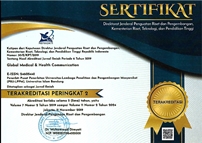Tuberculosis Treatment Using a Religious Approach
Abstract
Keywords
Full Text:
PDFReferences
Santosa D, Gurnida DA, Sastramihardja HS, Subarnas A. Effect of ESAT-6 on phagocytosis activity, ROS, NO, IFN-γ, and IL-10 in peripheral blood mononuclear cells of pulmonary tuberculosis patients. GMHC. 2022;10(2):97–103.
Dinas Kesehatan Kota Bandung. Tuberkulosis: “pandemi” selain COVID-19 [Internet]. Bandung: Dinas Kesehatan Kota Bandung; 2021 [cited 2023 Oct 13]. Available from: https://dinkes.bandung.go.id/tuberkulosis-pandemi-selain-covid-19.
Dinas Kesehatan Kota Bandung. Renstra Dinas Kesehatan 2018–2023 [Internet]. Bandung: Dinas Kesehatan Kota Bandung; 2019 [cited 2023 Oct 14]. Available from: https://dinkes.bandung.go.id/profil-kesehatan.
Solihin O, Lubis DP, Muljono P, Amanah S. Social and behavior change communication (SBCC) approach in tuberculosis management by Terjang Foundation. Mediator. 2023;16(1):1–13.
Machmud R, Medison I, Yani FF. Cultural and religious belief approaches of a tuberculosis program for hard-to-reach populations in Mentawai and Solok, West Sumatra, Indonesia. Kesmas. 2020;15(4):205–11.
Oman D, Riley LW. Infectious diseases, religion, and spirituality. In: Oman D, editor. Why religion and spirituality matter for public health: evidence, implications, and resources. Berlin: Springer; 2018. p. 153–63.
Dinas Kesehatan Kota Bandung. Profil Dinkes Kota Bandung 2020 [Internet]. Bandung: Dinas Kesehatan Kota Bandung; 2021 [cited 2023 Nov 10]. Available from: https://dinkes.bandung.go.id/profil-kesehatan/id.
Irasanti SN, Perdana R, Indriasari D, Yuniarti Y, Kamil A, Merduani W. Religiosity and stress on nurses during COVID-19 pandemic at a hospital in Bandung. Glob Med Heal Commun. 2022;10(1):13–7.
Achmad MK, Harrison J, Davies CL. Cultural sensitivity in health promotion program: Islamic persuasive communication. In: Proceedings of the 6th International Conference on Communication and Mass Media; 2008 May 19–22; Athens, Greece. Athens, Greece: Athens Institute; 2008. p. 1–11.
Umarella S, Farid M, Ab Rahman Z. Medicine and al-Quran recital approaches used on COVID-19 patients: a systematic review. Syst Rev Pharm. 2020;11(12):1163–70.
Koenig HG. Religion and mental health: research and clinical applications. Cambridge: Academic Press; 2018.
Adz-Dzaky HB. Konseling dan psikoretapi Islam. Yogyakarta: Al Manar; 2008.
Abdullah F, Hashi AA, Said AH, Mat Nor MB. Medical and Islamic perspectives on human immunodeficiency virus infection and its prevention. IMJM. 2019;18(2):153–9.
Asadzandi M. An Islamic religious, spiritual health training model for patients. J Relig Health. 2020;59(1):173–87.
Buback L, Kinyua J, Akinyi B, Walker D, Afulani PA. Provider perceptions of lack of supportive care during childbirth: a mixed methods study in Kenya. Health Care Women Int. 2022;43(9):1062–83.
Hasmiati H, Rita R, Amiruddin A. Dakwah Aisyiyah melalui kader tuberkulosis (Tb) care di Kabupaten Sinjai. J Ilmu Dakwah. 2021;41(1):30–42.
Koenig HG, Al Shohaib SS. Religiosity and mental health in Islam. In Moffic HS, Peteet J, Hankir AZ, Awaad R, editors. Islamophobia and psychiatry: recognition, prevention, and treatment. Cham, Switzerland: Springer Nature; 2019. p. 55–65.
Solaimanizadeh F, Mohammadinia N, Solaimanizadeh L. The relationship between spiritual health and religious coping with death anxiety in the elderly. J Relig Health. 2020;59(4):1925–32.
Paul Victor CG, Treschuk JV. Critical literature review on the definition clarity of faith, religion, and spirituality. J Holist Nurs. 2020;38(1):107–13.
Linton E, Jayasooriya S. Story from a survivor of tuberculosis. Lancet Respir Med. 2021;9(10):1098–100.
Olagoke AA, Olagoke OO, Hughes AM. Intention to vaccinate against the novel 2019 coronavirus disease: the role of health locus of control and religiosity. J Relig Health. 2021;60(1):65–80.
Sulis G, Pai M. Isoniazid-resistant tuberculosis: a problem we can no longer ignore. PLoS Med. 2020;17(1):e1003023.
Mesman AW, Rodriguez C, Ager E, Coit J, Trevisi L, Franke MF. Diagnostic accuracy of molecular detection of Mycobacterium tuberculosis in pediatric stool samples: a systematic review and meta-analysis. Tuberculosis (Edinb). 2019;119:101878.
DOI: https://doi.org/10.29313/gmhc.v12i1.11203
pISSN 2301-9123 | eISSN 2460-5441
Visitor since 19 October 2016:
Global Medical and Health Communication is licensed under a Creative Commons Attribution-NonCommercial-ShareAlike 4.0 International License.































.png)
_(1).png)
_(1).jpg)
